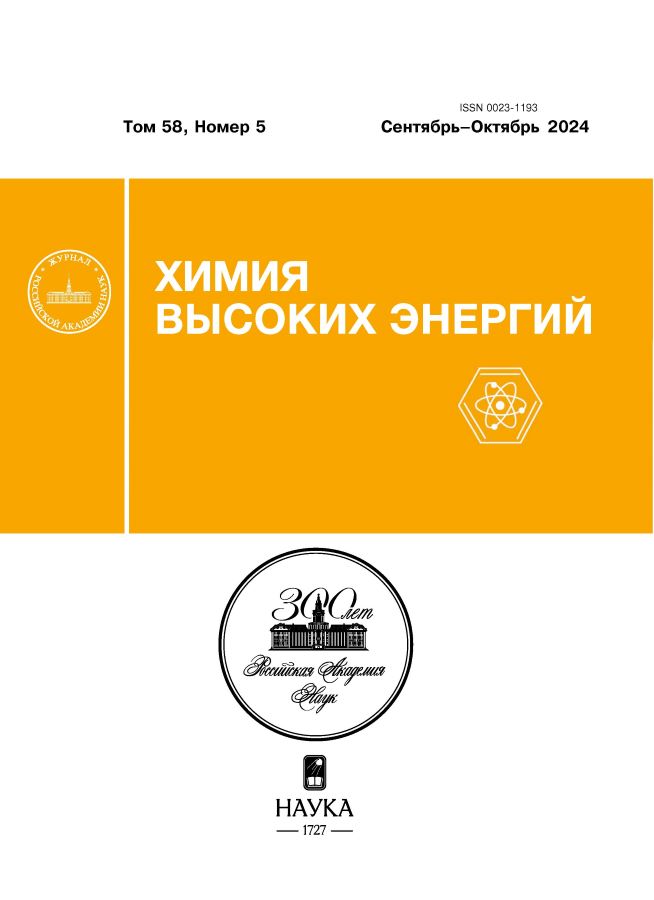Radiolytic degradation of ethylene glycol and glycerol in aqueous solutions
- 作者: Kholodkova E.M.1, Popova A.V.1, Artamonova K.A.1, Ponomarev A.V.1
-
隶属关系:
- Frumkin Institute of Physical Chemistry and Electrochemistry, Russian Academy of Sciences
- 期: 卷 58, 编号 5 (2024)
- 页面: 391-396
- 栏目: RADIATION CHEMISTRY
- URL: https://permmedjournal.ru/0023-1193/article/view/684846
- DOI: https://doi.org/10.31857/S0023119324050073
- EDN: https://elibrary.ru/TXQOZX
- ID: 684846
如何引用文章
详细
The influence of absorbed dose (up to 90 kGy) and the initial concentrations of ethylene glycol and glycerol (from 30 to 250 mg / L) on their degradation in aqueous solutions under a 3–MeV electron beam has been studied. Aeration of the solutions during irradiation decreased the yield of degradation. In the absence of aeration, the observed initial yields of degradation were about 0.23 μmol / J for ethylene glycol and about 0.14 μmol / J for glycerol. Degradation products formed in aqueous solutions are more resistant to ionizing radiation compared to the parent alcohols. A simultaneous reduction in alcohol concentration and chemical oxygen demand (COD) to standard values was achieved in solutions with an initial concentration of 30–40 mg / L at a dose of no higher than 2–3 kGy.
全文:
作者简介
E. Kholodkova
Frumkin Institute of Physical Chemistry and Electrochemistry, Russian Academy of Sciences
Email: ponomarev@ipc.rssi.ru
俄罗斯联邦, Moscow
A. Popova
Frumkin Institute of Physical Chemistry and Electrochemistry, Russian Academy of Sciences
Email: ponomarev@ipc.rssi.ru
俄罗斯联邦, Moscow
K. Artamonova
Frumkin Institute of Physical Chemistry and Electrochemistry, Russian Academy of Sciences
Email: ponomarev@ipc.rssi.ru
俄罗斯联邦, Moscow
A. Ponomarev
Frumkin Institute of Physical Chemistry and Electrochemistry, Russian Academy of Sciences
编辑信件的主要联系方式.
Email: ponomarev@ipc.rssi.ru
俄罗斯联邦, Moscow
参考
- Rebsdat S., Mayer D. Ethylene Glycol. Ullmann’s Encyclopedia of Industrial Chemistry. Wiley, 2000.
- Christoph R., Schmid, B., Steinberner U., Dilla W., Karinen R. Glycerol. Ullmann’s Encyclopedia of Industrial Chemistry. Wiley, 2006.
- Hilles A.H., Abu Amr S.S., Aziz H.A., Bashir M.J.K. // Advanced Oxidation Processes for Water and Wastewater Treatment. London: IWA Publishing, 2019. Р. 46–69.
- Ponomarev A.V., Ershov B.G. // Environmental Science and Technology. 2020. V. 54. P. 5331–5344.
- Nepachalovich P.S., Shadyro O.I., Bekish A.V., Shmanai V.V. // Free Radic. Res. 2020. V. 54. P. 732–744.
- Pikaev A.K., Kartasheva L.I. // Int.J. Radiat. Phys. Chem. 1975. V. 7. P. 395–415.
- Ponomarev A.V., Vlasov S.I., Kholodkova E.M. // High Energy Chemistry. 2019. V. 53. P. 314–320.
- Lutova Z.B., Panasyuk S.L., Yudin I.V. // Bull. Saint Petersbg. State Inst. Technol. 2019. P. 18–24.
- Plant A.G., Kos B., Jazbec A., Snoj L., Joyce M.J., Najdanovic-Visak V. // Ind.Eng. Chem. Res. 2023. V. 62. P. 21152–21163.
- Plan A.G., Kos B., Jazbec A., Snoj L., Najdanovic-Visak V., Joyce M.J. // Commun. Chem. 2021. V. 4. P. 132.
- Kholodkova E.M., Ponomarev A.V. // High Energy Chem. 2023. V. 57. P. 146–150.
- Ponomarev A.V. // Radiation Physics and Chemistry. 2020. V. 172. P. 108812.
补充文件














